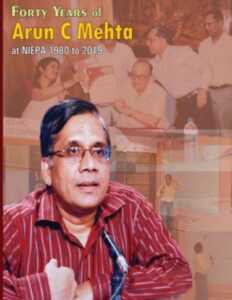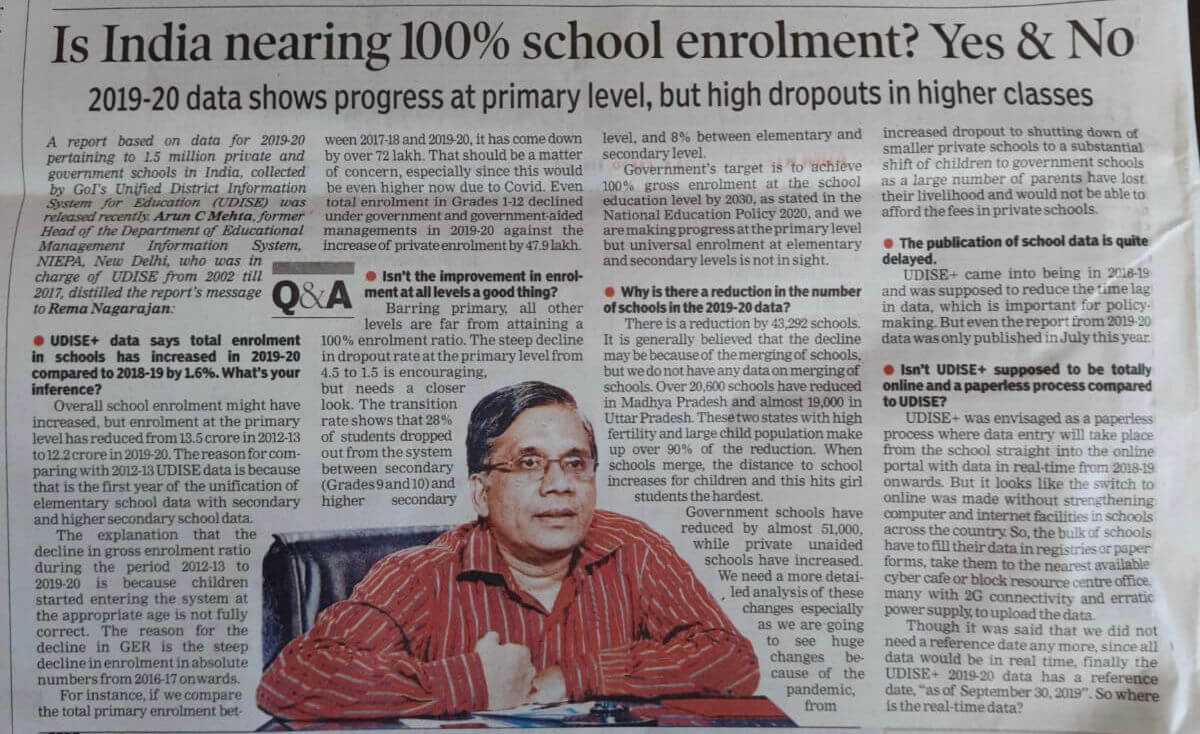Planning For Quality Elementary Education Under SSA
NIEPA
Training Programme on
Methodology and Techniques of District Planning in Education
Under Sarva Shiksha Abhiyan
(Shillong : May 1-6, 2000)
COPY RIGHT: NIEPA/NCERT, New Delhi – 110016, INDIA.
PLANNING FOR QUALITY OF ELEMENTARY EDUCATION
NCERT, New Delhi
Under SSA planning for improvement of quality of education has been equally emphasised as alongwith the universal enrolment and universal retention, universal achievement is equally important. This is so because the attendance and retention in schools depends, to a large extent, on the quality of education. The SSA draft document visualises elementary education of ‘Satisfactory Quality for All Children’ by 2010. So efforts towards achievement of quality should go hand in hand with efforts for enrolment and retention. As a first step of planning exercise, the factors affecting the quality of elementary education have to be identified and the information on such inputs may be collected from the secondary sources like village records, school registers etc and by Focus Group Discussions (FGDs) with headmasters, teachers and community members.
Some of the major components of quality aspects of elementary education on which information may be collected are as follows :
- Learning environment and support services
- Teachers’ competency
- Opportunity time
- Curriculum
- Teaching-Learning Material
- Classroom Processes
- Evaluation of Learning Achievement
1. Learning Environment and Support Services
As the learning environment of a school affects the quality of learning it is necessary to collect information on availability of pre-schooling facilities, community participation, socio-economic background of the students, early childhood care facilities, current status of the schools in the district, teachers’ position, financial and other incentives, facilities available to the teaching staff from different levels of the education department. All these information help in planning the activities and intervention strategies for quality improvement.
2. Teachers’ Competency
The teachers’ competency has a positive effect on improvement of quality of education. This is measured by the knowledge and skill of teachers in the subjects. Besides their level of motivation, interest and commitment and ability to interact with parents and community members also contributes to and influences the quality of teaching-learning process. As the assessment of teachers competency is a sensitive issue and sometimes open assessment may be counter productive, the information on educational qualifications, years of experience, area of specialisation, pre-service and in-service training etc. may help in assessing the level of competency. Also it is necessary to collect data on classroom organisation and management, methods used for curriculum transaction and the problems faced by the teachers to prepare an effective plan which would help to improve the overall quality of teaching-learning inputs provided by the teacher.
3. Opportunity
Opportunity time refers to the extent of time given by the children that is actually used by the teacher in teaching-learning activities. In order to calculate the opportunity time, information is needed on number of days the school is functioning in a year, number of classes handled by each teacher, attendance of teachers in a year etc. As availability and effective utilisation of time is a basic input in children’s learning, information on this aspect will facilitate better planning for teachers for proper allocation and effective utilisation of time by teachers.
4. Curriculum
Development of curriculum is a continuous process to suit the emerging learning needs of the children within the broad framework of National Policy on Education. NCERT had developed a “National Curriculum for Elementary and Secondary Education : A Framework” which is followed in original form in some states or in modified form in other states to respond to state and local specific contexts and needs. Under SSA, the focus is on making the curriculum for elementary education more and more contextual, adopting a holistic approach to educational development by incorporating knowledge, skills, values etc. relevant to the child’s life situation. Although it has been perceived that educational planning and management may be decentralised upto the district level but there are some problems in this regard. First to decide the extent of decentralisation and its methodology and second, to adopt a flexible mode of curriculum reform. To plan for curriculum reform, the information pertaining to the present curriculum and related aspects can be obtained from the schools and education offices.
5. Teaching-Learning Material
The use of teaching-learning material play a crucial role in actual curriculum transaction both at the primary and upper primary stage, and consequently on the quality of education. Hence it is essential to assess the type, availability, suitability and usability of various teaching-learning material. Information on availability of teaching-learning material like blackboard, textbooks, workbooks, teaching-learning aids, teachers’ guides may be collected at the school level to facilitate the planning at the district level for (i) developing need-based teaching-learning material; (ii) opening scope for using local-specific material (iii) involving teachers in developing the material and (iv) providing scope for capacity building of teachers.
6. Classroom Processes
Since the classroom provides the setting for all teaching-learning and an opportunity to the child for exploration, experimentation and communication, the more effective the classroom process better is the learning outcomes. Hence it is necessary to know how the classroom transactions are conducted and managed, status of classroom environment, various teaching-learning strategies used by teachers. The information on all these can be collected from classroom observations, interviews with teachers, students and headmasters etc. which will help in (i) improving interventions for all aspects of classroom processes, (ii) identifying training requirements for teachers/headteachers, and (iii) identifying areas for capacity building of supervisors.
7. Evaluation-Learning Achievement
To ensure meaningful learning both the outcome and the process of evaluation/assessment are important and essential. So it is necessary to measure the learner achievement from time to time in both cognitive and non-cognitive areas. Any plan for increasing learning achievement should focus on improving the quality of education which requires the knowledge about the factors affecting the child’s learning. The information on the indicators of achievement can be collected from school records, teachers’ interviews, pupils assessment and evaluation records which would help in (a) identifying the gaps in the evaluation strategies to develop new and improved strategies for enhancing learners’ achievement, and (b) adopting and improving upon existing assessment and evaluation tools.
In the process of planning for improving the quality of education, a district should have detailed information about the major indicators and also the issues under different areas, preferably in a tabular form. While the quantitative informations like enrolment, retention, physical facilities can be obtained from school records, the qualitative informations may be obtained through focus group discussion, quick assessment on different aspects of quality for which data is not available, learner achievement tests etc. The interventions or activities to achieve the quality of elementary education have to be visualised on the basis of information and be prioritised accordingly. It is desirable that a perspective plan should address the nature of activities, strategies etc. within a given time frame. While planning for quality related interventions needed, phasing of activities should be clearly assessed, visualised and incorporated, and may finally be shared will all concerned to make it more realistic, contextual and implementable.





